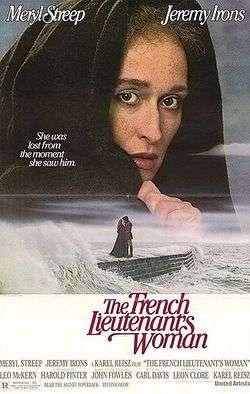The French Lieutenant's Woman

A 1969 Post Modern novel by English author John Fowles, adapted into a film in 1981. A pastiche of Victorian novels, The French Lieutenant's Woman sets up the familiar archetypes and dilemmas found in such books and set about quietly subverting them with a cavalcade of Lampshade Hangings, Shout Outs and fourth-wall breakings. Writing itself is one of the major subjects of the book, and the seemingly omniscient narrator/author's struggle to accurately convey his story are as much a concern of the book as the tribulations of the characters.
The year is 1867, and gentleman Charles Henry Smithson is fairly content with life. He is engaged to Ernestina Freeman, an industrialist's daughter who is kind, loving and rich. Within a few years he can look forward to inheriting his family's estate from his uncle. Although he has no great achievements to which to aspire, he has an agile mind and a passion for natural sciences. However, a lingering dissatisfaction with the predictability and restraint of the society around him gnaws at Charles, and this becomes increasingly hard to ignore after he meets Sarah Woodruff, a single governess variously nicknamed "Tragedy" and "the French lieutenant's woman".
Initially telling himself he is only curious, Charles is increasingly attracted to this strange, passionate woman, and finds himself at odds with the propriety that Victorian England so prizes.
- Alternative Character Interpretation: Within the novel, of Sarah. Charles sees her as a Broken Bird who is innocent of wrongdoing, Grogan suspects she may be manipulative and histrionic.
- Author Avatar: Fowles himself shows up near the end of the book.
- Babies Ever After: Played straight in the first ending and brutally averted in the second.
- Beta Couple: Sam, Charles' manservant, and Mary, one of the servants of Tina's family. Their relationship turns out to be more relevant to the main plot than it first seems.
- Betty and Veronica: Tina (Betty) and Sarah (Veronica).
- Multiple Endings: A pair of mutually exclusive possible endings, as well as an earlier "ending" which is shown to be Charles imagining the future.
- Hollywood History: Averted. The narration repeatedly pauses to discuss various aspects of Victorian England and point the inaccuracies of the modern era's perception of the era.
- Painting the Fourth Wall: The narrator repeatedly discusses the novel form and whether fictional characters can be said to have their own personality or will.
- The Jeeves: Averted. Sam is of lower social standing and, although good-hearted, is not especially competent. When push comes to shove, he is not very loyal, either.
- The Scrappy: The author/narrator takes an active dislike of Mrs. Poulteney.
- Yandere: Sarah, quite possibly.